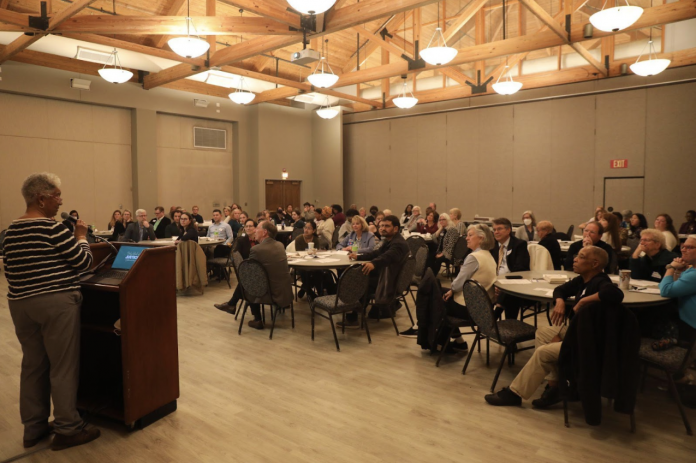Thursday, March 2, the College of William and Mary Office of Community Engagement facilitated a community discussion about democracy as part of the Daily Work of Justice conversation series in, Sadler Tidewater A.
Colonial Williamsburg Foundation Supervisor Janice Canaday opened the event with introductory remarks and laid out ground rules for conversations.
“Tonight we come together to talk about justice and democracy and how it impacts our daily lives,” Canaday said. “Even if we don’t know each other, we’re here for the same opportunities.”
She encouraged truthful and honest discussions as well as recognition of each individual’s unique experiences.
“We have an intention to go back and do something in our community,” Canaday said. “To create a better system of justice that incorporates everyone. A better system of democracy that protects everyone.”
Speakers, faculty and students shared everyday experiences of democracy in small groups moderated by conversation facilitators.
The series started in 2017 and has continued annually with intermissions in 2018 and 2021. Professor John McGlennon participated for the first time this year after receiving an invitation from the Office of Community Engagement. McGlennon serves on the James City County Board of Supervisors.
“I think it should have a lot of excitement and a lot of interest stimulated by the folks,” McGlennon said. “Nobody’s quite sure exactly how this operates. So I guess we’ll play it by ear.”
After 90 minutes of conversation, OCE Director Melody Porter and OCE Associate Director Elizabeth Miller closed out the event.
Porter emphasized the importance of taking small steps to create effective change.
“I heard about the distance between democracy and justice, and how those can be intertwined and yet so far apart from each other at the same time,” Miller said.
Porter and Miller thanked faculty and students, as well as invited speakers, which included journalists, elected officials, lawyers, doctors and residents.
Virginia Del. Amanda Batten, R-James City, shared her thoughts after the event.
“I enjoyed it. It’s always interesting when it’s something that’s really structured. It was a little bit stilted, I think, at times. But I think the longer we sat there, the more natural it was to have a bit of back and forth,” Batten said.
Batten said she appreciated that the issue of housing was brought up during the conversation.
“That’s a hot issue around here, but it’s not necessarily one that is going to grab nationwide headlines,” Batten said. “But it’s still a controversial one.”
Student Assembly Secretary of Outreach Abby Varricchio ’23, a student in the McGlennon Scholars Program, said she is hopeful about the culture of discourse in academia.
As a former intern for the Foundation for Individual Rights and Expression, Varricchio also conducted research on free speech and civil discourse on campus under McGlennon and Weingartner associate professor John Lombardini.
“I’m very hopeful that there’s this force of change on campus to bring these conversations, in a genuine way, into the forefront,” Varricchio said. “I’m also just pleasantly surprised at how many faculty members I saw come to this, how many administrators, students and just people from the community… especially seeing some elected officials, too. That was really awesome.”
Varricchio noted that to foster civil discourse, the community should engage in interpersonal conversations on a smaller scale than the event.
“I think the only way that we can be successful in achieving [that is by] … reining back in the norms of democracy and that feeling of community, that I think the campus craved during COVID,” she said.
The Administrator for the James City County Neighborhood Development Office Vaughn Poller, a facilitator at the event, shared lessons he learned from students.
“[My group] was so diverse and from so many different backgrounds,” Poller said. “What was really interesting to me was some of the issues on the College of William and Mary’s campus that I never would have thought about, [including] issues around being able to express oneself.”
He also reflected upon the conversation in relation to his role in local government.
“There was a discussion about people being afraid to say what they feel for fear of any backlash,” Poller said. “Being mindful of that when I’m working with the public. That’s very important.”

